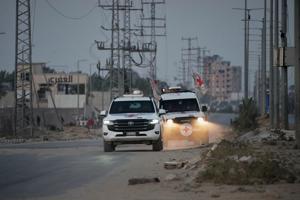World
Israel Confirms Remains from Gaza Handover Are Not Hostages

Israel has stated that the remains of three individuals handed over by Hamas to the Red Cross in Gaza do not belong to any hostages. This announcement, made on Saturday, represents another challenge to the fragile ceasefire brokered by the United States amid the ongoing conflict between Israel and Hamas. The handover of the remains follows Israel’s return of 30 Palestinian bodies to Gaza on Friday, marking a continuation of exchanges that began after militants previously transferred the remains of two hostages earlier in the week.
Israeli Prime Minister Benjamin Netanyahu‘s office confirmed that the remains do not belong to any hostages, but the identity of the individuals remains unclear. In a statement, Hamas’ armed wing indicated it had offered to provide samples of unidentified bodies, which Israel declined, insisting on the need for the remains to be examined. The statement read, “We handed the bodies over to stop the claims of Israel.” Health officials in Gaza face significant challenges in identifying bodies due to a lack of access to essential DNA testing kits.
Demonstrations continued in Tel Aviv on Saturday night, with families and supporters calling for the return of all hostages still held in Gaza. Since the ceasefire began on October 10, 2023, Palestinian militants have released the remains of 17 hostages, while 11 remain unaccounted for. Israel has urged for a swifter process, but Hamas has cited the extensive destruction in Gaza and the ongoing Israeli military presence as complicating factors.
In exchange for the remains of each Israeli hostage, Israel has been returning the unidentified remains of 15 Palestinians. To date, the number of Palestinian bodies returned by Israel stands at 225, of which only 75 have been identified by families, according to Gaza’s Health Ministry. The origins of these remains remain uncertain; they could be from individuals killed during the Hamas-led attack on southern Israel on October 7, 2023, or from other circumstances during the conflict.
The ceasefire is under increasing strain, particularly following Israeli airstrikes across Gaza earlier this week that resulted in over 100 deaths, which came after the killing of an Israeli soldier in Rafah, Gaza’s southernmost city.
Jordan’s foreign minister, Ayman Safadi, expressed concerns that Israel’s ongoing military presence in Gaza jeopardizes the ceasefire. Speaking at the Manama Dialogue security summit, he emphasized the need for a Palestinian police force to maintain security, supported by an international stabilization force under a U.N. Security Council mandate. “With Israel staying in Gaza, I think security is going to be a challenge,” Safadi remarked.
The U.S. peace plan, comprising 20 points, includes the formation of a temporary international stabilization force involving Arab nations and others, collaborating with Egypt and Jordan to secure Gaza’s borders and uphold the ceasefire. Notably, the U.S. has ruled out deploying American soldiers in Gaza.
During discussions, General Dan Caine, chairman of the Joint Chiefs of Staff, met with Israeli officials, with various countries expressing interest in contributing to a peacekeeping force. However, they have stressed the necessity of a clear U.N. mandate before committing troops.
Indonesia, the world’s most populous Muslim nation, has proposed sending thousands of troops to Gaza. Indonesian Foreign Minister Sugiono indicated that while the offer stands, specific details and terms remain unclear, pending a U.N. Security Council mandate. Indonesian officials have also advocated for an independent Palestinian state while reaffirming the need to ensure Israel’s security.
The conflict has resulted in unprecedented casualties, marking the deadliest and most destructive war between Israel and Hamas. The initial Hamas-led attack in October resulted in approximately 1,200 fatalities and the abduction of 251 individuals. The ongoing Israeli military offensive has led to more than 68,600 Palestinian deaths in Gaza, according to data from Gaza’s Health Ministry, which does not differentiate between civilians and combatants. Israel has disputed these figures, which are considered generally reliable by independent experts but have been contested by Israeli authorities.
As the situation continues to evolve, the international community watches closely, hoping for a resolution to a conflict that has caused immense suffering on both sides.
-

 World2 weeks ago
World2 weeks agoGlobal Air Forces Ranked by Annual Defense Budgets in 2025
-

 World2 weeks ago
World2 weeks agoMass Production of F-35 Fighter Jet Drives Down Costs
-

 Science2 weeks ago
Science2 weeks agoTime Crystals Revolutionize Quantum Computing Potential
-

 Top Stories2 weeks ago
Top Stories2 weeks agoNew ‘Star Trek: Voyager’ Game Demo Released, Players Test Limits
-

 Top Stories2 weeks ago
Top Stories2 weeks agoDirecTV to Launch AI-Driven Ads with User Likenesses in 2026
-

 World2 weeks ago
World2 weeks agoElectrification Challenges Demand Advanced Multiphysics Modeling
-

 Lifestyle2 weeks ago
Lifestyle2 weeks agoLia Thomas Honored with ‘Voice of Inspiration’ Award at Dodgers Event
-

 Entertainment2 weeks ago
Entertainment2 weeks agoFreeport Art Gallery Transforms Waste into Creative Masterpieces
-

 Lifestyle2 weeks ago
Lifestyle2 weeks agoDiscover Reese Witherspoon’s Chic Dining Room Style for Under $25
-

 Health2 weeks ago
Health2 weeks agoGavin Newsom Critiques Trump’s Health and National Guard Plans
-

 Entertainment2 weeks ago
Entertainment2 weeks agoFast & Furious Coaster Hits the Track at Universal Studios
-

 Health2 weeks ago
Health2 weeks agoResearchers Uncover New Insights into Cancer Mortality Causes









